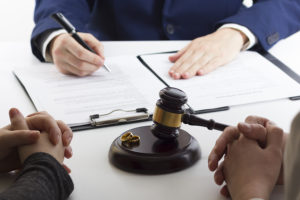
There are strict Nevada laws determining when a grand jury should indict, and it is important for defendants to understand what those rules are. A Las Vegas criminal defense attorney can provide representation in cases where defendants are facing indictment and can help those who are indicted to prepare an effective legal strategy. Call LV Criminal Defense today to find out what options may be available to you when an indictment is pending or has been handed down.
Nevada Revised Statute Section 172.255 provides details on when a grand jury should return an indictment against a defendant.
The law makes clear that a defendant should be indicted only if 12 or more jurors on the grand jury concur that indictment is appropriate. Jurors have to vote separately on each person being indicted, and on each count (each separate criminal charge) that the defendant is being indicted for.
If a grand jury decides to indict, the indictment must be returned to a judge in open court or if there is no judge, the indictment must be returned to the clerk in open court. The judge or court clerk must make a determination that at least 12 members of the grand jury concurred in handing down the indictment. If 12 grand jurors do not concur, the foreman must report this to the court.
If 12 members of the grand jury do not make the decision to indict, no indictment is handed down against the defendant. The failure of a grand jury to indict a defendant does not prevent the same charges from being submitted to the grand jury to reconsider, as long as the resubmission is permitted by the court.
Nick Wooldridge has a long track record of representing clients accused of serious federal and state crimes in Nevada.
This means that double jeopardy does not apply in cases where prosecutors convene a grand jury to try to indict a defendant. If the grand jury members do not agree to indict, a prosecutor can gather more evidence or find better witnesses and can try again. Defendants should thus not count on a failed indictment attempt being the end of their involvement with the criminal justice system in situations where prosecutors are committed to moving forward with a criminal case against a defendant.
If you are facing the possibility of indictment or if an indictment has been handed down, your best course of action is generally to begin preparing to defend yourself in criminal proceedings in case you are indicted. You should develop a legal strategy and determine if you wish to try to negotiate a plea agreement or if you believe you can introduce reasonable doubt to prevail in a criminal case against you. An indictment doesn’t mean you are found guilty of the crime- just that the case can move forward against you- so you have plenty of opportunity to try to avoid being convicted even if an indictment is handed down.
To learn more about your options and to begin preparing your effective legal strategy to fight being found guilty of a criminal offense, call LV Criminal Defense today to speak with an experienced Las Vegas criminal defense lawyer.